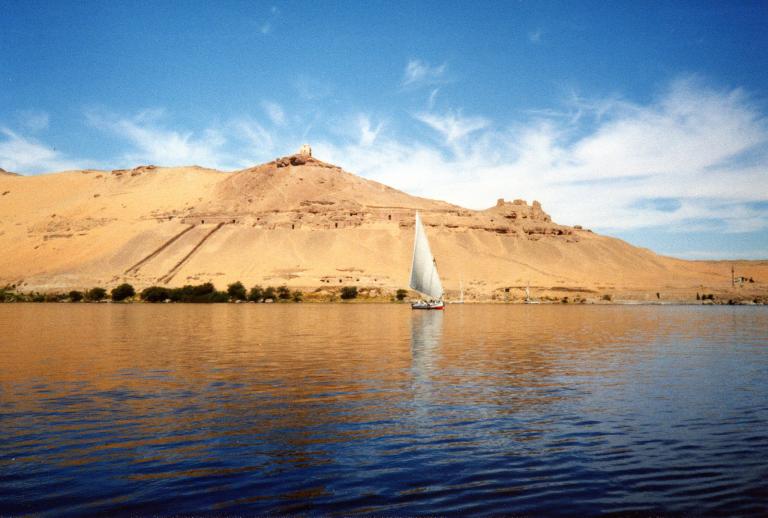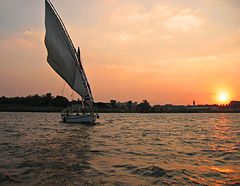
I don’t know whether I’ve told this story here before. Probably. But I occasionally use this blog — sorry! — as a depository for autobiographical fragments, so I’m going to record the episode:
Once, many years ago, when we were visiting Upper Egypt — which, in local parlance, means the southern part of the country, because it’s upstream on the Nile (which flows northward toward the Mediterranean) and also, accordingly, somewhat higher than the northern area of the Delta and the seacoast — we went for a ride on a felucca.
What is a felucca? The Arabic word felucca (فلوكة) may derive originally from the Greek ἐφόλκιον (epholkion), which refers to kind of small boat and comes from the Greek verb ephelkein (“to tow”). A felucca is a traditional wooden sailing boat that’s used in relatively calm and protected waters in the Red Sea area and in the eastern Mediterranean (e.g., near Malta); in Egypt and the Sudan (particularly along the Nile); and also in Iraq. The rigging of a felucca is a lateen sail — that is, a triangular sail, mounted at an angle. In my experience, it’s typically been a single such sail, although there can also be two.

(Wikimedia Commons)
Riding on a felucca on the Nile is one of our favorate things to do in Egypt. Traditionally, in the Cairo Branch, we would rent two or three large feluccas for our annual Easter sunrise service. And now, we always try to take our tours to Egypt out for a felucca ride in Cairo.
The particular felucca experience to which I’m referring here, though, happened in Upper Egypt, or the Saïd (sa-EED), near Luxor.
We were cruising slowly along the river through a really pleasant agricultural area, idyllic, green and relatively lush. Going upstream, we were tacking against the current. At one point, we came very close to the place where a peasant was working near the river bank. Suddenly, the wind failed. Not enough that we were reversing course, but enough to leave us more or less becalmed.
He was only about fifteen feet away, and I waved to him. He smiled and waved back, and I greeted him in Arabic. Suddenly, his smile vanished.
Anybody who looks like me and speaks Arabic, you see, is likely to be an Israeli. At least from his point of view, back then.
“You’re an Israeli!” he exclaimed. “You killed my brother!”
He began to remove his outer cloak and to move toward the water.
“No!” I yelled back. “I’m an American! And a Christian! I’m not Israeli!”
He kept moving closer, stepping into the water. “You’re an Israeli!” he continued to shout. “You killed my brother!” I continued to insist that I was neither Jewish nor Israeli, but I was also trying to figure out how I was going to handle this. He looked very serious.
Fortunately, just then, a gust of wind came up, and we were off, further off shore and somewhat further southward.
He gave up. I wouldn’t be surprised if he was unable to swim.
Anyway, I missed out that afternoon on what would surely have been a really interesting intercultural encounter.











